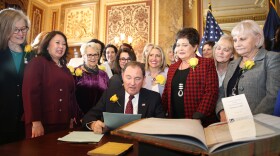
Dianna Douglas
Dianna Douglas has produced NPR's signature news pieces from across the nation and around the world. In the spring of 2010 she spent five weeks embedded with the US Army in Kandahar. Her work with the Special Forces in Meiwan Province, the Military Police in Kandahar City, and the recently-arrived 101st Airborne Division in Zhari document the small victories and overwhelming challenges of the American mission in Afghanistan.
In 2005, she spent a month in New Orleans covering the aftermath of Hurricane Katrina, and has returned frequently to the Gulf Coast in the years since to witness the recovery. She completed two tours in Iraq as the bureau chief and producer for NPR in Baghdad, and was part of the team that won an Alfred I. duPont-Columbia University Award for coverage of the American occupation and its effects on Iraq. She also produced two series with NPR's Barbara Bradley Hagerty one on the science of spirituality and one on polygamy among Muslim Americans—both winners of the Gracie Award.
Douglas has interviewed dozens of soldiers and Marines injured in the wars in Iraq and Afghanistan for a year-long series with NPR's Joseph Shapiro on the medical care that wounded veterans receive; she visited their homes, interviewed their families, attended their surgeries, and told their stories to NPR's audience.
Beginning her career at NPR in January 2003 as an intern for Weekend Edition Saturday with Scott Simon, Douglas then spent five years directing and producing Morning Edition. Prior to NPR, she lived in Rome for a year and a half as a missionary for The Church of Jesus Christ of Latter-day Saints.
Douglas received a Bachelor of Arts in journalism from Brigham Young University, in Provo, Utah. Originally from Atlanta, Douglas grew up listening to public radio on WABE. She lives in Washington, D.C.
-
Women in Utah became the first in America to vote under an equal suffrage law on Feb. 14, 1870. There are celebrations, but it means confronting the state's uncomfortable polygamy history, too.
-
Social scientists see long-term benefits to new dads spending a few months caring for a baby. But these studies won't nudge fathers to take leave if they still see a work culture that frowns on it.
-
Returns of toys and gadgets add up to more than $260 billion every year. Optoro, a startup in Maryland, tries to reduce the cost to retailers, and the cost to the environment.
-
Cleveland artist Viktor Schreckengost turns 100 today. He is being honored by 100 museums across the country for his work in industrial design, pottery, dinnerware, toys, sculpture and watercolors.




